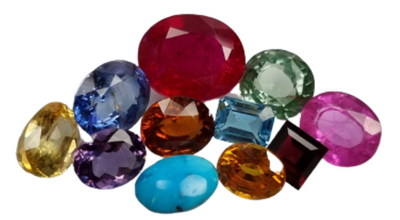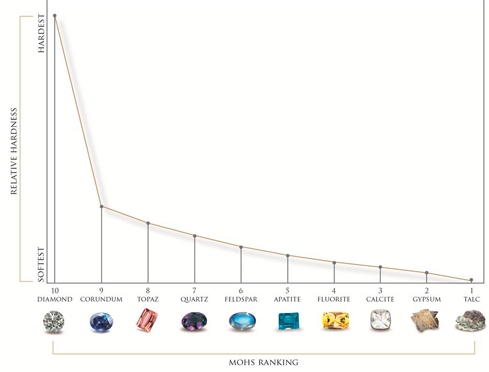Gemstone Hardness
Hardness is a mineral’s resistance to abrasion or scratching. Relative hardness (symbolized by H) is determined by trying to scratch a surface of one mineral with an edge or corner of a second mineral. If a scratch or abrasion results, the first mineral is the softer. Although rarely done by mineralogists, absolute values of hardness may be determined in several ways; the easiest is to use an indenting tool similar to ones used to determine of steel. The indenting tool measures the force necessary to produce a permanent indention on a flat surface. The results will be almost the same as those determined using scratch tests.
The Mohs scale rank minerals by their ability to scratch each other. Absolute hardness is the measure of a material’s ability to resist permanent deformation. The Mohs scale is related to absolute hardness but does not measure the same thing because resistance to scratching depends on additional factors. A simplified comparison to absolute hardness shows that the Mohs hardness scale is not linear and is close to being exponential. The hardness of the softest minerals are more similar than the hardness of the four hardest ones (quartz, topaz, corundum, diamond). Gypsum (H=2) is only slightly harder than talc (H=1), but diamond (H=10) has a hardness five times greater than corundum (H=9).
| Hardness | Material | Gemstone Hardness (Absolute) |
| 1 | Talc (Mg3Si4O10(OH)2) | 1 |
| 2 | Gypsum (CaSO4·2H2O) | 3 |
| 3 | Calcite (CaCO3) | 9 |
| 4 | Fluorite (CaF2) | 21 |
| 5 | Apatite (Ca5(PO4)3(OH-,Cl-,F-)) | 48 |
| 6 | Orthoclase (KAlSi3O8) | 72 |
| 7 | Quartz (SiO2) | 100 |
| 8 | Topaz (Al2SiO4(OH-,F-)2) | 200 |
| 9 | Corundum (Al2O3) | 400 |
| 10 | Diamond (C) | 1500 |
Relative hardness can be determined by conducting scratch tests to compare the hardness of a known minerals to the minerals in the Mohs hardness scale Alternatively, a good approximation of hardness may be made by comparing mineral hardness to a fingernail, penny, pocketknife, glass, or several other common objects. Scratch test are often straightforward, but there can be complications. Minerals specimens may be too small or too valuable to scratch.
Large samples may be made of many grains loosely cemented together so that scratch tests are not possible. Some minerals have different hardness depending on the scratch direction. Other may cleave or fracture when the test is performed. In still other cases, the results of scratch tests may be ambiguous, especially if two minerals have the same, or nearly the same, hardness.
The hardness of minerals relates to its weakest bond strength. Graphite has a hardness of 1 1/2, and diamond has a hardness of 10. Both are made of carbon, but in diamond, the carbon atoms are uniformly spaced and tightly bonded together, while in graphite bonding is very weak in one direction. Because bonds are usually not the same in all directions in minerals, hardness may vary depending on the direction a mineral is scratched.
In kyanite, for example, hardness varies from 4 1/2 to 6 1/2 depending on the direction of the scratch test. In most minerals, however, hardness is about the same in all directions. While the general relationship between hardness and bond strength is known, mineralogists have difficulty predicting hardness for complex atomic structures. For some simple ionic compounds, however, theoretical calculations match measurement well. Minerals with high density, highly charged ions, small ions, or covalent bonding tend to be hardest.
| Minerals | Hardness |
| Talc | 1 |
| Molybdenite | 1-1 1/2 |
| Pyrophyllite | 1 1/2 |
| Arsenic | 1-2 |
| Erythrite | 1-2 |
| Graphite | 1-2 |
| Nitratite | 1-2 |
| Covellite | 1 1/2 -2 |
| Orpiment | 1 1/2 -2 |
| Realgar | 1 1/2 -2 |
| Sulfur | 1 1/2 -2 1/2 |
| Carnotite | 2 |
| Gypsum | 2 |
| Niter | 2 |
| Pyrargyrite | 2 |
| Stibnite | 2 |
| Sylvite | 2 |
| Vivianite | 2 |
| Zinc | 2 |
| Argentite(acanthite) | 2-2 1/2 |
| Autunite | 2-2 1/2 |
| Borax | 2-2 1/2 |
| Cinnabar | 2-2 1/2 |
| Epsomite | 2-2 1/2 |
| Galena | 2-2 1/2 |
| Kaolinite | 2-2 1/2 |
| Proustite | 2-2 1/2 |
| Sepiolite | 2-2 1/2 |
| Brucite | 2 1/2 |
| Caranallite | 2 1/2 |
| Chalcanthite | 2 1/2 |
| Chlorargerite | 2 1/2 |
| Cryolite | 2 1/2 |
| Halite | 2 1/2 |
| Muscovite | 2 1/2 |
| Ulexite | 2 1/2 |
| Chlorite | 2-3 |
| Anglesite | 2 1/2 – 3 |
| Biotite | 2 1/2 – 3 |
| Bismuth | 2 1/2 – 3 |
| Boulangerite | 2 1/2 – 3 |
| Chalcocite | 2 1/2 – 3 |
| Copper | 2 1/2 – 3 |
| Crocoite | 2 1/2 – 3 |
| Gold | 2 1/2 – 3 |
| Silver | 2 1/2 – 3 |
| Gibbsite | 2 1/2 – 3 1/2 |
| Pyrolusite | 2 1/2 – 6 1/2 |
| Bornite | 3 |
| Calcite | 3 |
| Enargite | 3 |
| Kernite | 3 |
| Vanadinite | 3 |
| Wulfenite | 3 |
| Antimony | 3-3 1/2 |
| Atacamite | 3-3 1/2 |
| Barite | 3-3 1/2 |
| Celestite | 3-3 1/2 |
| Cerussite | 3-3 1/2 |
| Millerite | 3-3 1/2 |
| Witherite | 3-3 1/2 |
| Anhydrite | 3 1/2 |
| Strontianite | 3 1/2 |
| Antigorite | 3-4 |
| Tetrahedrite | 3-4 |
| Wavellite | 3-4 |
| Alunite | 3 1/2 -4 |
| Ankerite | 3 1/2 -4 |
| Antlerite | 3 1/2 -4 |
| Aragonite | 3 1/2 -4 |
| Azurite | 3 1/2 -4 |
| Chalcopyrite | 3 1/2 -4 |
| Cuprite | 3 1/2 -4 |
| Dolomite | 3 1/2 -4 |
| Heulandite | 3 1/2 -4 |
| Malachite | 3 1/2 -4 |
| Pentlandite | 3 1/2 -4 |
| Pyromorphite | 3 1/2 -4 |
| Rhodochrosite | 3 1/2 -4 |
| Sphalerite | 3 1/2 -4 |
| Stilbite | 3 1/2 -4 |
| Wurtzite | 3 1/2 -4 |
| Margarite | 3 1/2 -4 1/2 |
| Pyrrhotite | 3 1/2 -4 1/2 |
| Fluorite | 4 |
| Magnesite | 4 |
| Manganite | 4 |
| Siderite | 4 |
| Variscite | 4 |
| Colemanite | 4 – 4 1/2 |
| Platinum | 4 – 4 1/2 |
| Smithsonite | 4 – 4 1/2 |
| Wolframite | 4 – 4 1/2 |
| Zinicite | 4 – 4 1/2 |
| Chabazite | 4-5 |
| Apophyllite | 4 1/2 – 5 |
| Pectolite | 4 1/2 – 5 |
| Scheelite | 4 1/2 – 5 |
| Wollastonite | 4 1/2 – 5 |
| Apatite | 5 |
| Columbite | 5 |
| Lepidocrocite | 5 |
| Titanite(sphene) | 5 |
| Brookite | 5 – 5 1/2 |
| Goethite | 5 – 5 1/2 |
| Hausmannite | 5 – 5 1/2 |
| Natrolite | 5 – 5 1/2 |
| Niccolite | 5 – 5 1/2 |
| Triphylite | 5 – 5 1/2 |
| Galaucophane | 5-6 |
| Hornblende | 5-6 |
| Hypersthene | 5-6 |
| Ilmenite | 5-6 |
| Scapolite | 5-6 |
| Tremolite-actinolite | 5-6 |
| Uraninite | 5-6 |
| Kyanite | 5-7 |
| Analcime | 5 1/2 |
| Chromite | 5 1/2 |
| Cobaltite | 5 1/2 |
| Monazite | 5 1/2 |
| Monticellite | 5 1/2 |
| Periclase | 5 1/2 |
| Perovskite | 5 1/2 |
| Anatase | 5 1/2 – 6 |
| Anthophyllite | 5 1/2 – 6 |
| Arsenopyrite | 5 1/2 – 6 |
| Leucite | 5 1/2 – 6 |
| Nepheline | 5 1/2 – 6 |
| Rhodonite | 5 1/2 – 6 |
| Skutterudite | 5 1/2 – 6 |
| Sodalite | 5 1/2 – 6 |
| Diopside | 5 1/2 – 6 1/2 |
| Franklinite | 5 1/2 – 6 1/2 |
| Hematite | 5 1/2 – 6 1/2 |
| Magnetite | 5 1/2 – 6 1/2 |
| Amblygonite | 6 |
| Clinohumite | 6 |
| Cummingtonite | 6 |
| Kaersutite | 6 |
| Lazulite | 6 |
| Microcline | 6 |
| Orthoclase | 6 |
| Pigeonite | 6 |
| Sanidine | 6 |
| Turquoise | 6 |
| Albite | 6 – 6 1/2 |
| Anorthite | 6 – 6 1/2 |
| Marcasite | 6 – 6 1/2 |
| Prehnite | 6 – 6 1/2 |
| Pyrite | 6 – 6 1/2 |
| Rutile | 6 – 6 1/2 |
| Chloritoid | 6 1/2 |
| Chondrodite | 6 1/2 |
| Clinozoisite | 6 1/2 |
| Epidote | 6 1/2 |
| Jadeite | 6 1/2 |
| Norbergite | 6 1/2 |
| Vesuvianite | 6 1/2 |
| Cassiterite | 6-7 |
| Cristobalite | 6-7 |
| Sillimanite | 6-7 |
| Tridymite | 6-7 |
| Diaspore | 6 1/2 – 7 |
| Olivine | 6 1/2 – 7 |
| Sinhalite | 6 1/2 – 7 |
| Spodumene | 6 1/2 – 7 |
| Garnet | 6 1/2 – 7 1/2 |
| Boracite | 7 |
| Cordierite | 7 |
| Quartz | 7 |
| Staurolite | 7 – 7 1/2 |
| Tourmaline | 7 – 7 1/2 |
| Andalusite | 7 1/2 |
| Zircon | 7 1/2 |
| Coesite | 7 – 8 |
| Lawsonite | 7 – 8 |
| Beryl | 7 1/2 – 8 |
| Spinel | 7 1/2 – 8 |
| Topaz | 8 |
| Chrysoberyl | 8 1/2 |
| Corundum | 9 |
| Diamond | 10 |





